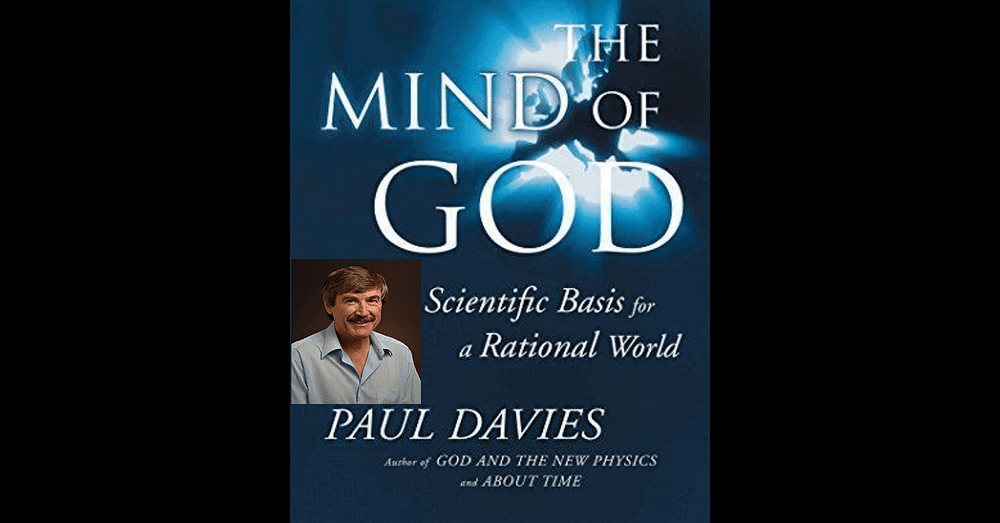This essay is about how some of some of the analogies used in “popular science” to describe/explain quantum behaviour, events and objects may not actually be taken to be analogies by many — or even most — laypeople. It also argues that even when the analogies are taken to be analogies, then they still may not always be helpful. What’s more, it’s this conflation of analogies with (as it were) realities that’s partly —or even largely — responsible for making quantum events, behaviour and objects “weirder than you think”.
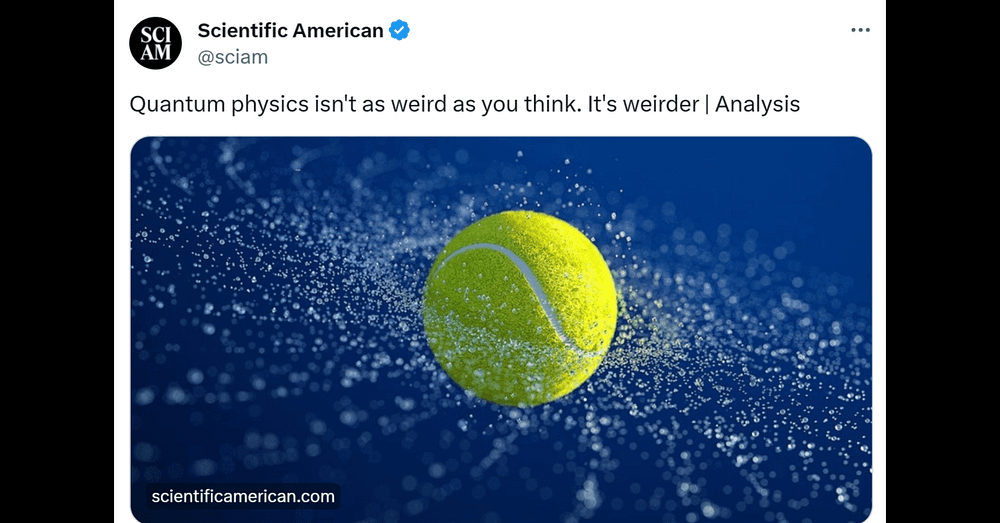
“Not
‘here is a particle, there is a wave’
but
‘if we measure things like this, the quantum object behaves in a manner we associate with particles; but if we measure it like that, it behaves as if it’s a wave’
Not
‘the particle is in two states at once’
but
‘if we measure it, we will detect this state with probability X, and that state with probability Y’.”
— Philip Ball. [This passage can be found here.]
Theoretical physicist and broadcaster Jim Al-Khalili spends some time telling his readers (in his book Life on the Edge: The Coming of Age of Quantum Biology) that particles aren’t like “billiard balls”, or that particle “spin” isn’t like, say, a spinning top. Yet he then uses words like “weird” and “counterintuitive” when describing the very same quantum events (or “behaviour”) and objects.
The argument in this essay is that the weirdness and counter-intuitiveness are at least partly a result of seeing quantum phenomena in these (analogical) ways.
As another example of this, it’s odd that immediately after Al-Khalili questions — and even rejects — the belief that electrons are “tiny classical particles”, he then states that
“if you behave like an atomic nucleus, then you would sometimes be able to pass, ghostlike, straight through a solid wall”.
Of course, there are no solid walls at the subatomic scale, and “you” could never “behave like an atomic nucleus”. Indeed, even when the words “solid wall”, “you”, and “ghostlike” are used in a purely analogical way, that usage may still be unhelpful. Or, at the very least, the analogies need to be taken for what they truly are — i.e., simply analogies.
All that said, perhaps I’m being too precious here.
Perhaps laypeople (at least the ones who that think about these things) don’t take these analogies to be anything other than… analogies.
So it can be admitted that there’s a danger of going farther and farther down a linguistic rabbit hole when discussing even the more careful descriptions of quantum phenomena (i.e., all those descriptions which exclude the mathematics). Indeed, all descriptions may — or even must — still include classical terms, analogies, metaphors, etc.
The Film Tenet Takes Scientific Liberties

Despite that qualification, after watching the film Tenet, I realised that even a director and writer who knows some science can still take liberties.
To offer one example.
Christopher Nolan conflates the abstract mathematics of “backwards causation” (as used in quantum mechanics) with human beings, etc. moving backward — and forward — in time.
In other words, Nolan applies what is true at the quantum scale to the classical scale. More correctly, the mathematics used at the quantum scale is then (as it were) made real at the classical scale. However, Jim Al-Khalili himself makes it clear (in various places) that he’s using analogies in his book. In the Nolan film, on the other hand, that isn’t the case. [See note 2.]
Yet it must be noted here that Christopher Nolan did admit to taking scientific liberties, despite having worked with the theoretical physicist Kip Thorne. (Thorne had previously offered advice on Nolan’s film Interstellar.) More relevantly, Nolan himself has said that
“Kip Thorne read the script and he helped me out with some of the concepts, though we’re not going to make any case for this being scientifically accurate”.
Of course, there’s been a long-running debate about whether or not there’s a firm (as the physicist Brian Greene put it) “line in the sand” which can be drawn between the quantum world and the classical world. Indeed, Jim Al-Khalil’s book, Life on the Edge: The Coming of Age of Quantum Biology (which is quoted later in this essay), is largely devoted to questioning this line in the sand as it has been set up between the wet science of biology and the hard science of quantum mechanics.
However, that isn’t really the issue here.
So are we back to Niels Bohr’s position?
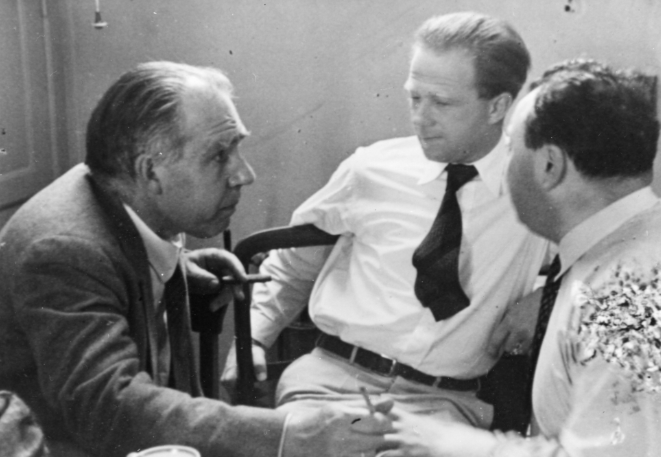
The Danish physicist once wrote:
“It is decisive to recognize that, however far the phenomena transcend the scope of classical physical explanation, the account of all evidence must be expressed in classical terms. The argument is simply that by the word ‘experiment’ we refer to a situation where we can tell to others what we have done and what we have learned and that, therefore, the account of the experimental arrangement and of the results of the observations must be expressed in unambiguous language with suitable application of the terminology of classical physics.”
Bohr appears to have been arguing that we have no choice but to use classical terms in our descriptions and explanations of quantum phenomena.
Thus, Bohr’s words above seems to be a simple account of his more technical correspondence principle. This principle states (broadly speaking) that the behavior of systems described by quantum mechanics reproduce classical physics when it comes to large (what’s called) quantum numbers.
However, there’s a distinction to be made here between Bohr’s idea that (as it were) everything becomes classical when enough quantum numbers are involved, and using classical terms to refer to purely quantum phenomena. In Bohr’s case, then, things become classical when enough quantum numbers are involved. In the case of this essay, however, the central theme has nothing to do with quantum numbers or quantum phenomena becoming classical phenomena. It’s mainly about classical terms and analogies being used to refer to purely (purely?) quantum phenomena (i.e., phenomena with “small quantum numbers”).
Having said all that, the quote from Bohr above doesn’t itself seem to be a very particular (or technical) expression of the correspondence principle. Or at least Bohr didn’t explicitly — or even implicitly — refer to the importance and relevance of “large quantum numbers”. Instead, he appears to stick to more general announcements about the need for a “classical physical explanation”. Indeed, Bohr also stated that observations “must be expressed in unambiguous language with suitable application of the terminology of classical physics”.
So perhaps Bohr’s overall message was that even trained physicists (i.e., those who’re adept at the mathematics) still need “classical pictures” in order to understand what’s going on. And that may be because in physics it’s almost (or even literally) impossible to rely entirely on the mathematics.
In any case, since Bohr has just been mentioned, let’s now cite a counterblast… if not against Bohr’s own (as it were) classicism, then against Schrödinger’s.
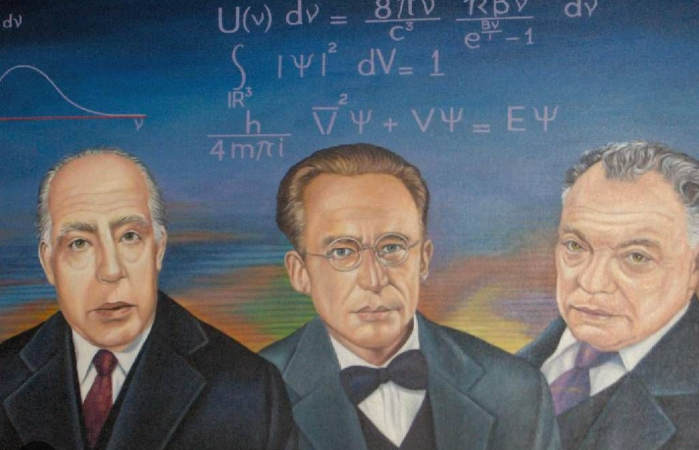
Werner Heisenberg once appeared to argue (some nine decades ago) that no classical words, descriptions or visualisations will ever accurately (or even at all) capture quantum phenomena.
In even stronger terms, this is what Heisenberg once wrote in a 1926 letter:
“The more I think of the physical part of the Schrödinger theory, the more detestable I find it. What Schrödinger writes about visualization makes scarcely any sense, in other words, I think it is shit.”
That passage is from a letter to Wolfgang Pauli. Pauli is also relevant here when it comes to his take (at least at one point in his career) on “spin” .
According to the philosopher Michela Massimi:
“People who came after [Wolfgang Pauli] introduced the term electro-spin. A young PhD student from Columbia called Ralph Kronig said that maybe we can interpret the two-valuedness by thinking of the electron as a spinning top that can be spun clockwise or anti-clockwise, and that gives the two values, plus one half and minus one half. Pauli, we heard, dismissed that idea as witty nonsense but, soon afterwards, two Dutch-American physicists, George Uhlenbeck and Samuel Goudsmit, published a paper introducing the idea of the electro-spin.”
The important words in the passage above are the following: “Ralph Kronig said that maybe we can interpret the two-valuedness by thinking of the electron as a spinning top [].” More precisely, the important word is “interpret”. Thus, even though Wolfgang Pauli said that such an “idea” is “witty nonsense”, that didn’t mean — even at this point in his career — that he also believed the term “spin” didn’t have a use in physics.
Jim Al-Khalili on Why Electrons Aren’t Weird

Jim Al-Khalili, in the following passage, tells us why the behaviour of electrons is not weird:
“[Electrons] should not therefore be regarded as moving and bouncing about like tiny classical particles, despite the fact that they are still treated this way in many standard biochemistry texts that continue to use the ‘solar system’ model of the atom.”
Al-Khalili then cites his own (or simply one) alternative “representation of electrons in an atom”. That is one of a
“spread-out, wavy cloud of ‘electronness’ surround[ing] the tiny nucleus, the ‘cloud of probability’ []”.
What Al-Khalili then concludes seems almost obvious.
He tells us that
“[i]t is perhaps not surprising [] electron waves [i.e., not particle-like electrons] should be passing through walls”.
It may seem odd that “standard biochemistry texts continue to use the the ‘solar system’ model of the atom”. However, that oddness may depend on various things.
Since the late 1920s, that solar (or Bohr) model has been largely rejected — at least by physicists. (Even school kids are warned about the model here.) Yet many of the very same scientists who reject its (as it were) literal truth may still be happy to use it in order to help visualisation and/or understanding.
In terms of “a spread-out, wavy cloud of ‘electronness’”, and also the “‘cloud of probability’”.
It may be hard for many laypersons to make sense of these statements. What’s more, how is moving from classical terms such as “particle” and “solar system” to the classical term “cloud” any better?
It’s also odd that immediately after Al-Khalili questions — and even rejects — the idea that electrons are “tiny classical particles”, he then uses the problematic word “barrier” in the context of quantum tunneling. (It is here that the linguistic rabbit hole arises again.)
More particularly, what is the physical reality of this cloud of probability and electronness? Indeed, is there any physical reality here at all? Alternatively, are we talking purely about (abstract) mathematics?
Surely that latter option can’t be the case.
It would mean that the maths is all about the maths .
Alternatively put, it would mean that the maths isn’t about — or a description of — anything that isn’t itself maths.
Jim Al-Khalili on Quantum Tunnelling
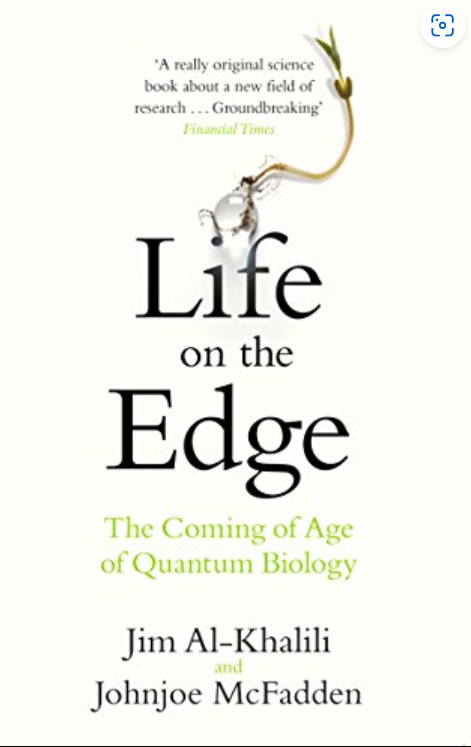
Jim Al-Khalili also offers his readers a similar warning about quantum tunnelling. He writes:
“Although it would be wrong to think that quantum tunnelling entails the leaking through barriers of physical waves; rather, it is due to abstract mathematical waves that provide us with the probability of instantaneously finding the quantum particle on the other side of the barrier.”
Yes, Al-Khalili explicitly states that “it would be wrong to think that quantum tunnelling entails the leaking through barriers of physical waves”.
So does that mean that there’s no literal tunnelling at all?
Alternatively and at the very least, is Al-Khalili basically stating that there’s nothing equivalent to tunnelling (as it would occur at the “classical” scale) that’s going on at the quantum scale? In other words, is there no equivalent of, say, tunnelling through a six-foot-thick gold wall with a wooden spoon — despite the hype? Less dramatically, is there even an equivalent of simply tunnelling through the ground with a wooden spoon into your next-door-neighbour’s living room?
In technical terms.
It’s certainly the case that when tackling quantum tunnelling, what we’re partially (or even mainly) dealing with is probability — or what’s called a probability wave. Thus, on this reading at least, the wave is literally abstract — i.e., not a wave at all! Thus, the word “wave” is a colourful way of describing an abstract mathematical function.
Basically, these particles (or waves) — unlike snooker balls, etc. — can, with a small probability, tunnel to the other side of a “barrier”.
The important point here is that we’re dealing with quantum waves or particles. Or, at the very least, waves or particles as they’re seen in quantum mechanics. Thus, because we’re dealing with waves or particles (though perhaps not only because), then no probability of a particle or wave tunnelling across a barrier can ever be zero.
So, in the concrete terms of quantum tunnelling, the probability of a given particle (or wave) being “found” on the opposite side of a given barrier is not zero.
It could happen.
Indeed, it often does.
(Actually, isn’t it possible that a snooker ball could do so too?)
Conclusion: Quantum Weirdness Still Remains
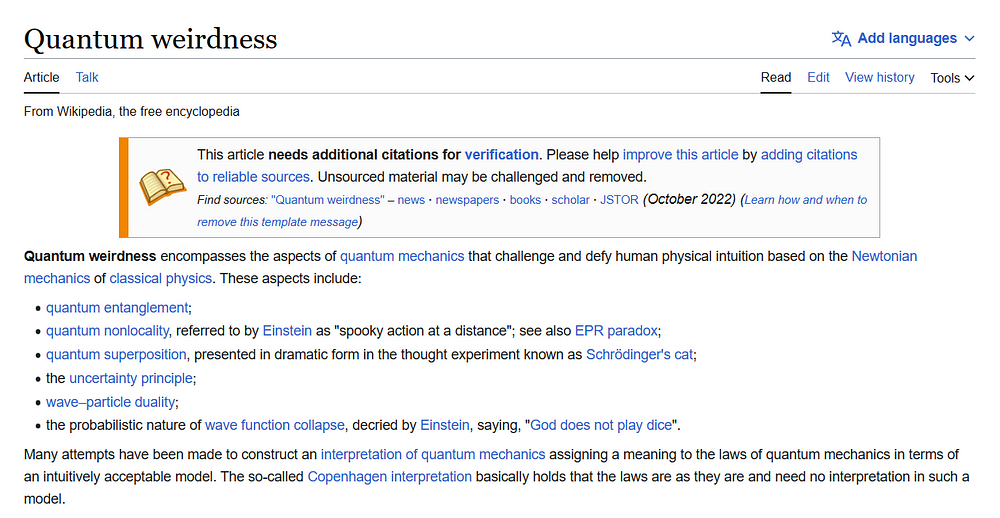
It can be freely admitted that quantum (to use classical words) objects and events are “weird” in their own unique ways. However, they aren’t weird simply because they do things that classical objects don’t do.
Readers shouldn’t expect quantum events and objects to behave like classical objects and events. However, when people do attempt to squeeze quantum square shapes into classical round holes (or vice versa), then, sure, things do indeed get weird!
To put that another way.
When we use the same words we use to describe, say, playing snooker to describe what happens at the quantum scale, then no wonder things become weird. Indeed, this is almost like expecting a lice or virus to behave (entirely) like a dog — or even like a human being.
In addition. Although this issue isn’t all about size, it must be stated that particles at the quantum scale are at a level that is fantastically smaller than our snooker ball. In terms of detail, a sheet of paper is about six orders of magnitude thicker than an atom. Now think about how much “thicker” a snooker ball is to a sheet of paper. (100,000,000 atoms would stretch along the width of your fingernail.)
As for Al-Khalili’s barrier through which the particle/wave tunnels.
Usually, this tunneling only happens when it comes to barriers of thickness around nth nanometres or smaller. (A nanometre is equal to one billionth of a metre.)
To sum up.
Let’s happily accept weirdness in the sense that weird things really do happen in the quantum “world”. However, let’s not make things even weirder (or weird in the wrong ways) by expecting apples to be oranges.
Notes:
(1) Regarding the main image which opens this essay. Many physicists and other scientists emphasise the “weirdness” of quantum mechanics in order to sell their subject to the general public. They believe that most people won’t be interested in physics if they don’t “sex it up”. They may be right. They may also sex up their own work in order to sell more copies of their articles and books.
(2) The processes or events involving subatomic particles, their interactions, etc. within a specific experiment (or within a given sample space) can be reversed. However, if a football match were to be reversed, then things would be very different. Yet even though viewers would quickly note the time reversal of a football match (i.e., if that reversed match were ever made real), then it still wouldn’t go against any of the laws of physics.
In the film Tenet, “time travel” is tied to entropy.
The problem (or simple fact) is that although a fridge does “reverse entropy” (or ‘Negentropy’), it only does so in a “local” or insulted environment (i.e., within an enclosed system). In other words, a refrigerator alone — and even every fridge on the planet — can’t reverse the entropy of the Universe or even a space larger than the refrigerator itself. And neither does a single fridge — even in its own local space — make time run backwards.
That said, this entirely depends on what we take time to be in the first place.







